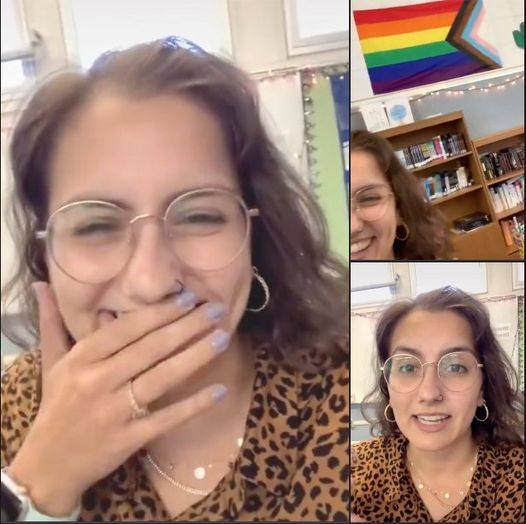Kristin Pitzen, a teacher in the Newport Mesa Unified School District in Orange County, California, found herself at the center of a national firestorm after posting TikTok videos that many viewed as mocking the U.S. flag and promoting personal political views in a public classroom. What she intended as a gesture of inclusivity turned into a widely debated controversy about patriotism, professional boundaries, and the role of identity in education.
In one now-deleted video, Pitzen explained that she had removed the American flag from her classroom because it made her feel “uncomfortable.” During the daily Pledge of Allegiance, she told students they could choose whether to stand. When one student asked what to face without the flag present, she jokingly pointed to a pride flag hanging in the room.
Another video showed her classroom decorated with pride-themed items. In it, Pitzen made a lighthearted but provocative remark: “I pledge allegiance to the queers,” aiming to express support for LGBTQ+ students. Although her intention may have been to create a welcoming space, her tone and the absence of the national flag upset many viewers.
The backlash came swiftly. Parents placed American flags around the school in protest. One mother, whose son serves in the military, voiced her anger in a local interview, saying, “That flag stands for the freedoms we all enjoy—and the people who died protecting them. Our children should be taught to honor that.” Many others echoed the sentiment, calling Pitzen’s remarks disrespectful.
The videos quickly circulated online, sparking debate across platforms and being picked up by national media. Critics accused Pitzen of putting personal beliefs above professional responsibility, while defenders argued she was supporting marginalized students and expressing her views in her personal time. Still, many questioned whether social media was the appropriate place to air such controversial content connected to a public school setting.
In response to the uproar, Pitzen deleted her TikTok account and stepped away from other social media. The school district responded by removing her from classroom duties and launching an internal investigation. In an official statement, the district acknowledged public concern and emphasized its commitment to inclusivity while maintaining a politically neutral and respectful learning environment.
The incident has become a focal point in a broader national debate over free speech, identity politics, and professionalism in education. Some see Pitzen’s actions as an attempt to affirm LGBTQ+ students in an often-hostile world. Others believe she overstepped, prioritizing personal ideology at the expense of shared community values.
Legal experts have weighed in, pointing out that while public employees like teachers do have First Amendment protections, those rights are not absolute in professional settings. “When educators speak in the classroom or on public platforms tied to their role, they’re held to a different standard,” one law professor explained. “It’s about balance—between expression and responsibility.”
As the investigation continues, Pitzen’s story remains a flashpoint in the ongoing cultural conversation around identity, patriotism, and the responsibilities of educators in an increasingly divided public sphere. Whether viewed as a bold stand for inclusivity or a lapse in professional judgment, the consequences of her actions have become a cautionary tale about the powerful impact of social media and the deep sensitivities around symbols, values, and education in America today.
